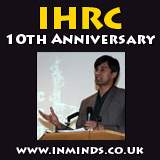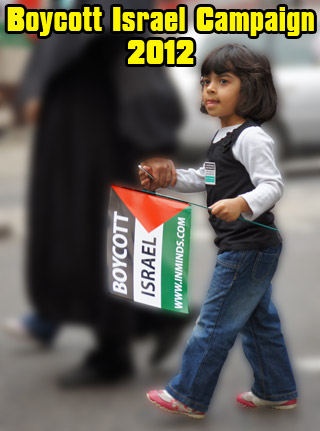
 Innovative Minds © 2014. All Rights Reserved. www.inminds.co.uk | ||||
|
Comment: Amusing zionist article which explores why Irish academics support Palestine and demand a boycott of Israel. The author suggests every possibility, including lust for arab oil, accept the most obvious reason - that they oppose apartheid Israel because its the right thing to do! The absurd lie that Hamas's refusal to recognise the apartheid state and wish its end amounts to a call for the genocide of the Jewish people is repeated. No one interpreted the call for an end to the apartheid state in South Africa as a call for the genocide of the whites, so why when its apartheid Israel its end is interpreted as genocide of the Jews? The article quotes a Fred Taub saying that the boycott "has a direct impact on the US economy because Israel is a key developer of new technologies" and that "Foreign governments should not be allowed to dictate US foreign policy". The reason Israel is a developer of new technologies is that the US government gives technology firms a fat tax break if they open their development centres in Israel in preference to the US - a glaring example of a foreign country dicating US policy!
Why Do Irish Academics Persist In Advocating Boycott and Divesting From Israel?Dr. Alex Grobman, Israel Hasbara Committee Divestment campaigns are back in the news once again after a short lull. Their objective is to terminate university investments in Israel in order to impede the countryâs economic growth and development. By using âeconomic warfare,â they want âto destroy Israel's economy,â according to Fred Taub, president of Divestment Watch. As part of this campaign, attempts are made to prevent Israeli academic and political leaders from speaking on university campuses. Another goal is to eliminate Israeli academic research funds since Israeli academics are viewed as key elements and âcollaboratorsâ of the Jewish state.
The responsibility for ending the conflict lies with the aggressor. Israel is the aggressor.
Professor James Bowen, University College Cork An association of dozens of Palestinian charities, unions and non-governmental organizations (NGOs) organizes these divestment campaigns according Gerald Steinberg, Professor of political studies at Bar Ilan University. Why do âpoliticized churchesâ and academics demand divestment from Israel, he asks, but not from Syria, Saudi Arabia and Egypt? A number of the groups and individuals are ideologically opposed to Jewish sovereignty and to the existence of a Jewish state. Others have simply been duped by the media that all too often reports Arab propaganda as fact. Irish academics are particularly adamant in boycotting Israeli academic institutions. In a letter to the Irish Times on 12 September 2006, 61 Irish professors urged academic institutions throughout the world to boycott Israeli institutions of higher education. The Jerusalem Post reported that when Professor James Bowen of the Department of Computer Science at University College Cork was questioned about Hamas' charter and inflammatory language, (which openly calls for the extermination of Jews in Israel), and was asked whether those who signed the petition would consider boycotting Palestinian academic institutions as a result, Bowen replied, "the accusation of genocide against Hamas is libelous. The responsibility for ending the conflict lies with the aggressor. Israel is the aggressor." The Irish embassy in Israel condemned the petition as âcounterproductive,â yet the Irish government has helped foster this enmity because of its own negative attitudes towards Israel. By examining the governmentâs views toward the Jewish State, we can see how Irish academics reflect their own governmentâs attitude toward Israel, and why they are so tenacious in advocating this boycott. In Ireland and the Palestine Question 1948-2004, Professor Rory Miller explains that the Irish believe they possess a unique insight into the Arab/Israeli conflict because of their neutrality and their distinct âmoralâ position in the international arena. This endows them with the right and obligation to seek peaceful solutions in international interaction. Ireland granted Israel de facto recognition in 1949,but did not grant it de jure recognition until May 1963. Part of the reason was Irelandâs aversion toward partition, which was a result of its own fight for independence from Britain. The Irish saw partition as a cruel means of solving territorial disputes that would not bring peace. An even more fundamental reason for Irish opposition to granting Israel recognition Miller suggests, was that from the late 1940s, the Irish clergy, political parties, the general public and the media have had a special interest in the Holy Land because of their concern about the Christian Holy Places, especially in Jerusalem. The Vatican had supported the internationalization of the city and the holy sites, and the Irish were greatly influenced by the âVatican factor,â and adamant that the rights of Catholics be maintained. When the Irish granted de jure recognition, this did mean any inherent or overt acceptance of Israelâs sovereignty over Jerusalem. Oil is an additional factor why the Irish side with the Arabs. Miller quotes the Irish Times in mid-1963 that âif it comes to a matter of competition for the friendship of Israel or the Arab League, nobody can doubt what the outcome will be: the oil-rich Arab states possess an attraction denied to Israel.â The rights of Arab refugees are another ongoing concern as was Israelâs refusal to withdraw from the Golan Heights and the âoccupied territories.â Failure to resolve the refugee issue is viewed as the âgreatest single obstacle,â to peace in the region. The Irish did not have the political and diplomatic clout to compel Israel to compensate the Arabs and allow some of the refugees to return to Israel. Instead, they donated funds to United Nations Relief and Works Agency (UNWRA). A further area of contention occurred after the Irish provided troops to serve first as UN observers and later as members of the UN Interim Force in Lebanon (UNIFIL). Whenever there was a conflict between the Christian militias and Irish soldiers, the Irish blamed Israel. This led Israeli Ambassador Shlomo Argov, Israeli Ambassador to Britain and Ireland, to wonder how people in Dublin could sit around âsmuglyâ and âpass judgmentâ about events in another part of the world. He found it particularly difficult to understand how the Irish could be so âinsensitive to the Christian minority in Lebanon,â and later charged Ireland âof leading the pack in [the] constant flagellation of Israel.â Miller sees PLO Chairman Yasser Arafatâs visit to Ireland in mid December 1993 as recognition of Irelandâs ongoing effort to advance the position of the Arab refugees and support of the PLO. The visit also demonstrated the extensive backing the PLO enjoyed among the Irish people. When Israel instituted roadblocks to protect its citizens against terrorist attacks, Irish politicians attacked Israel. This demonstrated a callous disregard for the suffering of Israel at the hands of Arab terrorists, and a failure to recognize that a major provision of the Oslo Accords was that the Palestinians were now responsible for the security of the Israel. The Irish Times reported that between 1994-1997, 131 Israelis had been killed and 446 wounded by Arab terrorists. The Irish government condemned the escalation of violence against the Israelis between 2000 â2004, but criticized Israel for its policies and actions that exacerbated or prolonged the need for Arabs to use violence. They even had the temerity to stand behind Yasser Arafat even when there was evidence of his corruption and duplicity. Given the Irish governmentâs rationalizations for Arab terrorism and intransigence, it is not surprising that Irish academics would be among those who want to harm the Israeli economy and its schools of higher education. Americans should actively oppose the Irish and any other academic groups that engage in this unjustified and morally reprehensible activity, because as Fred Taub points out, divestment campaigns are an attack on the U.S. âForeign governments,â he urges, âshould not be allowed to dictate US foreign policy,â and they must not be permitted to promote the destruction of the economy of another democracy. Israel's economy, Taub concludes, âhas a direct impact on the US economy because Israel is a key developer of new technologies, including in medicine, computers and even space exploration; not to mention that it is the democracy and free-market economy example for the Middle-East. The Arab boycott of Israel is the single biggest impediment to peace, as peace can not be sustained without economic cooperation.â Source: http://www.infoisrael.net/cgi-local/text.pl?source=4/b/iv/261220061 Also Of InterestPage URL: http://www.inminds.co.uk/article.php?id=34
|
|
Support Us
If you agree with our work then please support us.Campaigns INMINDS Facebook Live Feed Latest Video's
INMINDS Twitter Feed Tweets by @InmindsComFeatured Video's
You need Flash player 8+ and JavaScript enabled to view this video.
[all videos (over 200)..] Featured MP3 Podcast  "They [Met Police] initially denied it, that they had sent officers to Israel to find out how to deal with suicide bombers. When I asked them would you have done the same thing after the Brixton riots and sent people to South Africa (under the apartheid regime) to find out how to deal with black people? They didn't have an answer. I asked the question 'do you have a shoot to kill policy?', they said no they didn't, over a number of years, and then it was finally, tragically, proven that they did have.. we finally cut our ties [ceased meetings with the Met Police in protest], I came out thinking of the police as insincere, hypocritical, having double standards." Islamic Human Rights Commission Islamic Human Rights Commission 10th Anniv. Nov 2007 [15min / 7Mb] [all podcasts..] Newsletter Feedback |
 |
 |















































